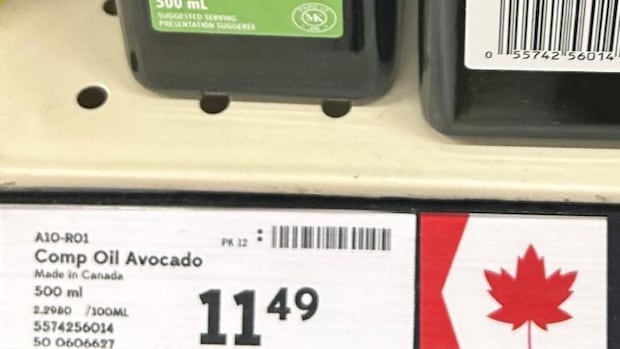The Canadian Food Inspection Agency (CFIA) has uncovered a total of 12 instances where retailers have engaged in “maple washing,” a practice where businesses utilize Canadian branding, such as the maple leaf, to market imported food items.
These breaches originated from complaints reported to the CFIA between February and May, with all cases (except one) involving major national grocery chains, as per the agency’s communication with CBC News via email.
While the CFIA has the authority to impose fines of up to $15,000 per violation, no fines or penalties were issued in these incidents, even in the case that took four months to resolve completely.
The federal food oversight body mentioned that it took necessary actions in each instance, resulting in the retailers rectifying the misrepresentation. The CFIA did not disclose the names of the retailers involved, but CBC News verified that the extended case pertained to avocado oil sold at a Sobeys-owned store near Edmonton.
Concerned supporters of the Buy Canadian movement fear that without consequences for retailers, the practice of “maple washing” will persist.
Brenda Nicholls, a resident of Hamilton, expressed her commitment to scrutinizing labels in grocery stores after discovering deceptive signage. She emphasized the need for the CFIA to enforce fines to pressure retailers into making changes.
A CBC News investigation in July uncovered over a dozen instances of maple washing at a Toronto Sobeys and one at a Loblaw-owned No Frills store.
Nicholls, influenced by CBC’s investigation, became vigilant in checking store labels and found misleading information on products like blackberries and asparagus at local Loblaw-owned stores.
Although Nicholls did not lodge a complaint with the CFIA, she did bring the issue to the attention of the store staff, leading to corrections being made.
Marketing professor Tim Dewhirst emphasized the importance of holding retailers accountable for repeated errors to ensure regulatory effectiveness.
Both Loblaw and Sobeys, as Canada’s largest grocery chains, stressed their commitment to accurate country-of-origin labeling, acknowledging the challenges posed by vast inventory and evolving suppliers.
Federal regulations mandate that food labels and in-store signage must be precise and not deceptive to consumers.
The CFIA reported receiving 160 complaints concerning food origin claims this year, with 41% filed between mid-July and August, resulting in 40 identified violations.
The use of labels like “Product of Canada,” “Made in Canada,” and “Prepared in Canada” necessitates varying levels of Canadian content, excluding the packaging process, as clarified by the CFIA.
In one CFIA case, Sheila Young from Edmonton filed a complaint in April regarding Sobeys’ Compliments avocado oil, falsely labeled as “Made in Canada” despite being imported.
Young’s complaint, along with CBC’s investigative findings in July, highlighted multiple instances of imported products with misleading Canadian branding at Sobeys, prompting corrective actions.
The CFIA acknowledged resolving Young’s avocado oil case after a prolonged investigation to prevent similar occurrences in the future.
Young expressed satisfaction with the closure of her case but suggested that Sobeys should face penalties for the extended resolution process.
The CFIA emphasized its commitment to addressing food mislabeling and selecting enforcement measures based on risk factors, compliance history, and responsiveness from companies.
To combat mislabeling, Dewhirst advised consumers to thoroughly examine product labels, especially amidst numerous instances of misrepresentation.
Following her encounters with mislabeling, Nicholls opted to frequent independent stores specializing in locally sourced products to ensure accuracy.
Ultimately, consumers are encouraged to voice their concerns through their purchasing decisions to drive change.



